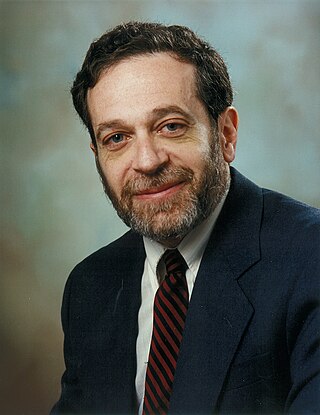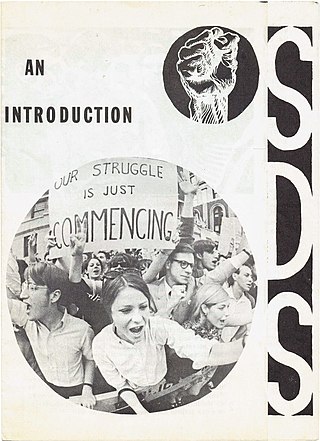Related Research Articles

The Weather Underground was a far-left Marxist militant organization first active in 1969, founded on the Ann Arbor campus of the University of Michigan. Originally known as the Weathermen, the group was organized as a faction of Students for a Democratic Society (SDS) national leadership. Officially known as the Weather Underground Organization (WUO) beginning in 1970, the group's express political goal was to create a revolutionary party to overthrow the United States government, which WUO believed to be imperialist.

Judith Pamela Butler is an American philosopher and gender studies scholar whose work has influenced political philosophy, ethics, and the fields of third-wave feminism, queer theory, and literary theory.

Raymond Henry Williams was a Welsh socialist writer, academic, novelist and critic influential within the New Left and in wider culture. His writings on politics, culture, the media and literature contributed to the Marxist critique of culture and the arts. Some 750,000 copies of his books were sold in UK editions alone, and there are many translations available. His work laid foundations for the field of cultural studies and cultural materialism.

The United Farm Workers of America, or more commonly just United Farm Workers (UFW), is a labor union for farmworkers in the United States. It originated from the merger of two workers' rights organizations, the Agricultural Workers Organizing Committee (AWOC) led by organizer Larry Itliong, and the National Farm Workers Association (NFWA) led by César Chávez and Dolores Huerta. They became allied and transformed from workers' rights organizations into a union as a result of a series of strikes in 1965, when the mostly Filipino farmworkers of the AWOC in Delano, California, initiated a grape strike, and the NFWA went on strike in support. As a result of the commonality in goals and methods, the NFWA and the AWOC formed the United Farm Workers Organizing Committee on August 22, 1966. This organization was accepted into the AFL–CIO in 1972 and changed its name to the United Farm Workers Union.

Robert Bernard Reich is an American professor, author, lawyer, and political commentator. He worked in the administrations of Presidents Gerald Ford and Jimmy Carter, and served as Secretary of Labor from 1993 to 1997 in the cabinet of President Bill Clinton. He was also a member of President Barack Obama's economic transition advisory board.
The history of the socialist movement in the United States spans a variety of tendencies, including anarchists, communists, democratic socialists, Marxists, Marxist–Leninists, Trotskyists and utopian socialists. It began with utopian communities in the early 19th century such as the Shakers, the activist visionary Josiah Warren and intentional communities inspired by Charles Fourier. Labor activists, usually Jewish, German, or Finnish immigrants, founded the Socialist Labor Party of America in 1877. The Socialist Party of America was established in 1901. By that time, anarchism also rose to prominence around the country. Socialists of different tendencies were involved in early American labor organizations and struggles. These reached a high point in the Haymarket massacre in Chicago, which founded the International Workers' Day as the main labour holiday around the world, Labor Day and making the eight-hour day a worldwide objective by workers organizations and socialist parties worldwide.

The counterculture of the 1960s was an anti-establishment cultural phenomenon and political movement that developed in the Western world during the mid-20th century. It began in the early 1960s, and continued through the early 1970s. It is often synonymous with cultural liberalism, and with the various social changes of the decade. The effects of the movement have been ongoing to the present day. The aggregate movement gained momentum as the civil rights movement in the United States had made significant progress, such as the Voting Rights Act of 1965, and with the intensification of the Vietnam War that same year, it became revolutionary to some. As the movement progressed, widespread social tensions also developed concerning other issues, and tended to flow along generational lines regarding respect for the individual, human sexuality, women's rights, traditional modes of authority, rights of people of color, end of racial segregation, experimentation with psychoactive drugs, and differing interpretations of the American Dream. Many key movements related to these issues were born or advanced within the counterculture of the 1960s.
Mike Marqusee was an American writer, journalist and political activist in London.

Frank Marshall Davis was an American journalist, poet, political and labor movement activist, and businessman.
Daniel H. La Botz is an American labor union activist, academic, journalist, and author. He was a co-founder of Teamsters for a Democratic Union (TDU) and has written extensively on worker rights in the United States and Mexico. He is a member of the socialist organization Solidarity, which describes itself as "a democratic, revolutionary socialist, feminist, anti-racist organization," which comes out of the Trotskyist tradition. La Botz ran in 2010 for a seat in the United States Senate for the Socialist Party. He is also a member of the Brooklyn branch of the Democratic Socialists of America and a co-editor of the socialist journal New Politics.
The American Left can refer to multiple concepts. It is sometimes used as a shorthand for groups aligned with the Democratic Party. At other times, it refers to groups that have sought egalitarian changes in the economic, political, and cultural institutions of the United States. Various subgroups with a national scope are active. Liberals and progressives believe that equality can be accommodated into existing capitalist structures, but they differ in their criticism of capitalism and on the extent of reform and the welfare state. Anarchists, communists, and socialists with international imperatives are also present within this macro-movement. Many communes and egalitarian communities have existed in the United States as a sub-category of the broader intentional community movement, some of which were based on utopian socialist ideals. The left has been involved in both the Democratic and Republican parties at different times, having originated in the Democratic-Republican Party as opposed to the Federalist Party.
The Watsonville riots was a period of racial violence that took place in Watsonville, California, from January 19 to 23, 1930. Involving violent assaults on Filipino American farm workers by local white residents opposed to immigration, the riots highlighted the racial and socioeconomic tensions in California's agricultural communities.

Erik Olin Wright was an American analytical Marxist sociologist at the University of Wisconsin–Madison, specializing in social stratification and in egalitarian alternative futures to capitalism. He was known for diverging from classical Marxism in his breakdown of the working class into subgroups of diversely held power and therefore varying degrees of class consciousness. Wright introduced novel concepts to adapt to this change of perspective including deep democracy and interstitial revolution.

The Free Speech Movement (FSM) was a massive, long-lasting student protest which took place during the 1964–65 academic year on the campus of the University of California, Berkeley. The Movement was informally under the central leadership of Berkeley graduate student Mario Savio. Other student leaders include Jack Weinberg, Michael Rossman, George Barton, Brian Turner, Bettina Aptheker, Steve Weissman, Michael Teal, Art Goldberg, Jackie Goldberg and others.

Students for a Democratic Society (SDS) was a national student activist organization in the United States during the 1960s and was one of the principal representations of the New Left. Disdaining permanent leaders, hierarchical relationships and parliamentary procedure, the founders conceived of the organization as a broad exercise in "participatory democracy". From its launch in 1960 it grew rapidly in the course of the tumultuous decade with over 300 campus chapters and 30,000 supporters recorded nationwide by its last national convention in 1969. The organization splintered at that convention amidst rivalry between factions seeking to impose national leadership and direction, and disputing "revolutionary" positions on, among other issues, the Vietnam War and Black Power.
The New Left was a broad political movement that emerged from the counterculture of the 1960s and continued through the 1970s. It consisted of activists in the Western world who campaigned for a broad range of social issues such as civil and political rights, feminism, gay rights, drug policy reforms, and the rejection of traditional family values, social order, and gender roles. The New Left differs from the traditional left, in that it tends to lean more in favor of social justice compared to previous eras. However, others have used the term "New Left" to describe an evolution, continuation, and revitalization of traditional leftist goals.

Jack Weinberg is an American environmental activist and former New Left activist who is best known for his role in the Free Speech Movement at the University of California, Berkeley in 1964.
El Malcriado was a Chicano/a labor newspaper that ran between 1964 and 1976. It was established by the Chicano labor leader Cesar Chavez as the unofficial newspaper of the United Farm Workers during the Chicano/a Movement of the 1960s and early 1970s. Published in both English and Spanish editions, El Malcriado provided a forum for migrant workers to criticize working conditions and served as a way to organize the collective voice of Mexican American farmworkers. The newspaper's contents ranged from articles on union activities, coverage of labor issues, political commentary, cartoons, satire, and artwork. It is an example of ethnic press or alternative media that developed from political movements and immigrant communities within the United States to challenge existing power structures and gain political leverage.
The 1985–1987 Watsonville Cannery strike was a labor strike that involved over 1,000 workers at two food processing facilities in Watsonville, California, United States. The facilities were owned by Watsonville Canning and Richard A. Shaw Inc., two of the largest frozen food processors in the United States, while the workers were all union members of the International Brotherhood of Teamsters (IBT) Local 912. The strike began on September 9, 1985, and completely ended about 18 months later, on March 11, 1987.
Andrew Zermeño is an American cartoonist from Salinas, California. During the 1960s and 1970s, he was the art director and cartoonist for the Chicano/a labor newspaper El Malcriado.
References
- ↑ Davis, Mike; Sprinker, Michael (1988). "Watsonville: A Mexican Community on Strike". Reshaping the US Left: Popular Struggles in the 1980s. London, UK: Verso. pp. 157–169. ISBN 978-0860919094.
- ↑ Beckett, Francis (27 January 2012). "Trampling Out the Vintage by Frank Bardacke – review". The Guardian. Retrieved 9 May 2013.
- ↑ Freeman, Jo (2004). At Berkeley in the Sixties: The Education of an Activist, 1961-1965. Indiana University Press. p. 294. ISBN 978-0-253-21622-9.
- ↑ Carlsson, Chris; Leger, Mark (1990-07-17). Bad Attitude: The Processed World Anthology. London, UK: Verso. p. 134. ISBN 978-0-86091-946-9.
- ↑ Catalog record for "Trampling Out the Vintage". Worldcat. OCLC 668194738 . Retrieved 9 May 2013.